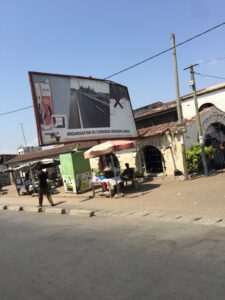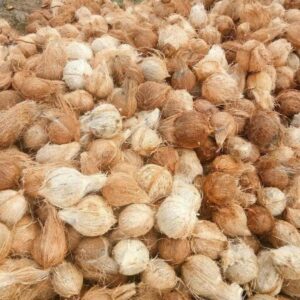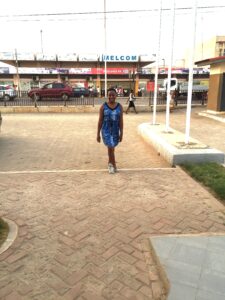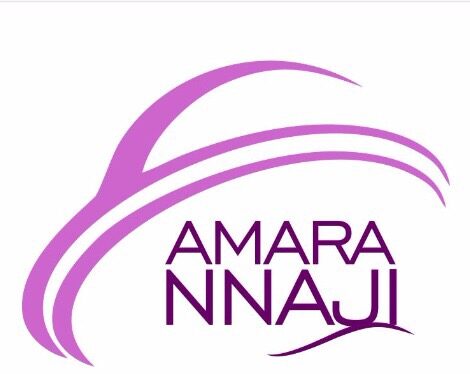“The way coffee is consumed here is the same way we take soft drinks back home” I pointed to a Coffee Shop as we walked through the Promenade. “Except of course that Nigerians consume more than the other countries”
“Not true. The other countries consume more alcohol than us”. Ruqqy replied. We were walking from the Weekly Women’s Wellbeing session organised for vulnerable women by one of the Charities
“Which African country can you name that consumes more than us?” I asked since population-wise, we are Africa’s biggest market. Some countries could pass for one densely populated state in Nigeria.
“Togo people drink a lot of Alcohol” she responded
“Do you mean Pito? [a local beverage] I wanted to know.
“No, real Alcohol. Their men are lazy and do not work. They only stay outside and drink” she surmised
“Did you live in Togo?”
“No. Only saw them from the car as we drove past”
“So you have been to Togo? I enquired
“I saw them drinking when we were driving past Lome to Abidjan. And the driver said that is how they drink from morning to night. That their men are lazy and start drinking from morning”
“Well, I have been to Togo regularly over the years. I travelled the

ECOWAS corridor++ a lot and recall seeing the men through all the markets.
Truthfully, one thing which struck me about them is that despite having such an expansive coastline, you only see the crowd at nights, not in the daytime. Unlike we and our Area boys who live on the beach”
“Moreover, if the men are lazy drunks then they are probably like some of us. I recalled living in the Plateau as a teenager and their infamous Burukutu*+ parlours. Within Nigeria, we still have tribes known for the indolence of their men who opt for alcohol over gainful labour”

“We consume more than them because in addition to the carbonated and other local drinks we all make, they sell fresh coconuts which we do not” I argued
I saw them all through Benin, Ghana and even far-away Senegal. Although there were hawkers with carbonated drinks like we have across Nigeria.”
“So how possible is it that they drink more than us? I know they sell alcohol at garages like we do. At least I saw them at Hilla-Kondji and at Seme*** I can not recall the Lagos Park at +*Aflao.

What I recall of the Aflao border is that it is the neatest border among them all. A big feat for a border which has the grand Marche Assigame** beside it No hawkers around and it had this big Melcom superstore close by.
And as Ruqqy confidently made those absolute statements, it struck me how we often are deceived by other people’s absolutes.
Here was someone with a second-hand report from a driver who most probably drives into the country; sits in his taxi and sleeps off until it is his turn to load for the return trip. Yet, was passing down the statement like an absolute formed from experience. However as we chatted, vivid images tumbled across my head:
Visuals of the various time I had spent with the locals in the interiors.
The male traders I encountered at the Asigame and Assiyeye+- markets. The Nigerian traders up at dawn to start selling at the second-hand Assiyeye known as Biafran market. The Berber-Arabs with their shops all around town, and the Francophone-Hausa speakers I repeatedly sought help with when my rudimentary French failed me.
I saw myself strolling along the sun-kissed beaches where business only resumes After-hours. And no cluster of men idling around
These clusters of men have all been grouped as ‘lazy’ by one driver whose circle of interaction is a subset of men drinking at the park.
And another person borrowed that narrative and ran with it cross-Atlantic.
Now, can you imagine I was someone else without the lived experience of Togo?

How do you think her assertion could have shaped my views? When next you are tempted to repeat unverified information about someone else as an absolute – pause and think of the damage you could inflict.
Notes:
- ++Ecowas Corridor is the stretch from Lagos to Abidjan. Member countries have a treaty allowing for free movement of Peoples and Trade. Which unfortunately is frustrated by most government agencies along that route.
- *Burukutu is a staple drink of the Plateau people in Nigeria’s Middle Belt. Brewed with fermented sorghum.
- ***Hilla-Kondji is the border between Benin and Togo. The only people-oriented border on that route where you can cross seamlessly.
- ***Seme is the border in Lagos between Nigeria and Benin. The most notorious on that route. The notoriety and disorderliness of the Nigerian agencies ended up corrupting their Beninoise counterparts across the road.
- Aflao: border town between Togo and Ghana. The next unfriendly border after Seme. From my experience, the Francophone borders are more humane than the Anglophones.
- +- Asigame is Togo’s largest international market in Lome. Similar to the Dantokpa market of Cotonou while Assiyeye is another of their large market with a section where second-hand fashion items are resold thriftly. Majorly by Nigerian residents. It attracts bulk buyers from Nigeria and elsewhere.
Discover more from amarannajiwrites
Subscribe to get the latest posts sent to your email.

Nice
Glad you find it so. Thank you.